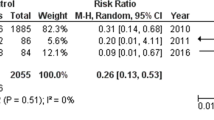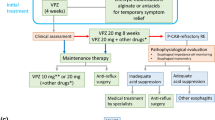Abstract
Background
The relationship between aliments and pathophysiological abnormalities leading to gastroesophageal reflux disease (GERD) symptoms elicitation is unclear. Nevertheless, patients often report symptoms after ingestion of specific foods.
Aims
To identify in primary care setting the presence of foods able to trigger GERD symptoms, and evaluate whether a consequent specific food elimination diet may result in clinical improvement.
Methods
Diagnosis of GERD and quantification of reflux symptoms were done according to GERD-Q questionnaire (positive when > 8). During clinical data collection, patients were asked to report aliments associated with their symptoms. Also, a precompiled list of additional foods was administered to them. Then, patients were requested to eliminate the specific foods identified, and to come back for follow-up visit after 2 weeks when GERD-Q questionnaire and clinical data collection were repeated.
Results
One-hundred GERD (mean GERD-Q score 11.6) patients (54 females, mean age 48.7 years) were enrolled. Eighty-five patients reported at least one triggering food, mostly spicy foods (62%), chocolate (55%), pizza (55%), tomato (52%), and fried foods (52%). At follow-up visit, the diagnosis of GERD was confirmed in only 55 patients, and the mean GERD-Q score decreased to 8.9. Heartburn reporting decreased from 93 to 44% of patients, while regurgitation decreased from 72 to 28%. About half of the patients agreed to continue with only dietary recommendations.
Conclusions
Most patients with GERD can identify at least one food triggering their symptoms. An approach based on abstention from identified food may be effective in the short term.


Similar content being viewed by others
References
Bolin TD, Korman MG, Hansky J, Stanton R. Heartburn: community perceptions. J Gastroenterol Hepatol. 2000;15:35–39.
El-Serag HB, Sweet S, Winchester CC, Dent J. Update on the epidemiology of gastro-oesophageal reflux disease: a systematic review. Gut. 2014;63:803–871.
Jones R, Ballard K. Healthcare seeking in gastro-oesophageal reflux disease: a qualitative study. Eur J Gastroenterol Hepatol. 2008;20:269–275.
Savarino E, Bredenoord AJ, Fox M, et al. Advances in the physiological assessment and diagnosis of GERD. Nat Rev Gastroenterol Hepatol. 2017;14:665–676.
Gyawali CP, Roman S, Bredenoord AJ, et al. Classification of esophageal motor findings in gastro-esophageal reflux disease: conclusions from an international consensus group. Neurogastroenterol Motil. 2017;29:e13104.
Frazzoni M, de Bortoli N, Frazzoni L, et al. Impairment of chemical clearance and mucosal integrity distinguishes hypersensitive esophagus from functional heartburn. J Gastroenterol. 2017;52:444–451.
Frazzoni M, Frazzoni L, Tolone S, De Bortoli N, Savarino V, Savarino E. Lack of improvement of impaired chemical clearance characterizes PPI-refractory reflux-related heartburn. Am J Gastroenterol. 2018;113:670–676.
Gyawali CP, Sifrim D, Carlson DA, et al. Ineffective esophageal motility: concepts, future directions, and conclusions from the Stanford 2018 symposium. Neurogastroenterol Motil. 2019;31:e13584.
Ribolsi M, Gyawali CP, Savarino E, et al. Correlation between reflux burden, peristaltic function, and mucosal integrity in GERD patients. Neurogastroenterol Motil. 2020;32:e13752.
Savarino E, Zentilin P, Marabotto E, et al. Overweight is a risk factor for both erosive and non-erosive reflux disease. Dig Liver Dis. 2011;43:940–945.
Fass R. Alternative therapeutic approaches to chronic proton pump inhibitor treatment. Clin Gastroenterol Hepatol. 2012;10:338–345.
Ness-Jensen E, Hveem K, El-Serag H, Lagergren J. Lifestyle intervention in gastroesophageal reflux disease. Clin Gastroenterol Hepatol. 2016;14:175–182.
Sethi S, Richter JE. Diet and gastroesophageal reflux disease: role in pathogenesis and management. Curr Opin Gastroenterol. 2017;33:107–111.
Dağlı Ü, Kalkan İH. The role of lifestyle changes in gastroesophageal reflux diseases treatment. Turk J Gastroenterol. 2017;28(Suppl 1):S33–S37.
Surdea-Blaga T, Negrutiu DE, Palage M, Dumitrascu DL. Food and gastroesophageal reflux disease. Curr Med Chem. 2019;26:3497–3511.
Nebel OT, Fornes MF, Castell DO. Symptomatic gastroesophageal reflux: incidence and precipitating factors. Am J Dig Dis. 1976;21:953–956. https://doi.org/10.1007/BF01071906.
Lim LG, Tay H, Ho KY. Curry induces acid reflux and symptoms in gastroesophageal reflux disease. Dig Dis Sci. 2011;56:3546–3550. https://doi.org/10.1007/s10620-011-1799-3.
Jarosz M, Taraszewska A. Risk factors for gastroesophageal reflux disease: the role of diet. Prz Gastroenterol. 2014;9:297–301.
El-Serag HB, Satia JA, Rabeneck L. Dietary intake and the risk of gastro-oesophageal reflux disease: a cross sectional study in volunteers. Gut. 2005;54:11–17.
Dibley LB, Norton C, Jones R. Don’t eat tomatoes: patient’s self-reported experiences of causes of symptoms in gastro-oesophageal reflux disease. Fam Pract. 2010;27:410–417.
Choe JW, Joo MK, Kim HJ, et al. Foods inducing typical gastroesophageal reflux disease symptoms in Korea. J Neurogastroenterol Motil.. 2017;23:363–369.
Kubo A, Block G, Quesenberry CP Jr, Buffler P, Corley DA. Dietary guideline adherence for gastroesophageal reflux disease. BMC Gastroenterol. 2014;14:144.
Mehta RS, Song M, Staller K, Chan AT. Association between beverage intake and incidence of gastroesophageal reflux symptoms. Clin Gastroenterol Hepatol. 2019;S1542–3565(19):31380–31381.
Fan WJ, Hou YT, Sun XH, et al. Effect of high-fat, standard, and functional food meals on esophageal and gastric pH in patients with gastroesophageal reflux disease and healthy subjects. J Dig Dis. 2018;19:664–673. https://doi.org/10.1111/1751-2980.12676.
Ljungdalh JS, Rubin KH, Durup J, Houlind KC. Treatment of newly-diagnosed gastroesophageal reflux disease: a nationwide register-based cohort study. Scand J Gastroenterol. 2019;54:830–837.
Jones R, Junghard O, Vakil N, Halling K, Wernersson B, Lind T. Development of GerdQ, a tool for the diagnosis and management of gastro-esophageal reflux disease in primary care. Aliment Pharmacol Ther. 2009;30:1030–1038.
Jonasson C, Wernersson B, Hoff DAL, Hatlebakk JG. Validation of the GerdQ questionnaire for the diagnosis of gastro-oesophageal reflux disease. Aliment Pharmacol Ther. 2013;37:564–572.
Nilsson M, Johnsen R, Ye W, Hveem K, Lagergren J. Lifestyle related risk factors in the aetiology of gastro-oesophageal reflux. Gut. 2004;53:1730–1735.
Nocon M, Labenz J, Willich SN. Lifestyle factors and symptoms of gastro-oesophageal reflux—a population-based study. Aliment Pharmacol Ther. 2006;23:169–174.
Mwandri MB, Mwita JC, Magafu MG, Kilonzo KG, Urasa SJ. Risks, precipitants and clinical presentation of gastro-oesophageal reflux disease at the Kilimanjaro Christian medical centre in Tanzania. Pan Afr Med J. 2014;19:119.
Kim J, Oh SW, Myung SK, et al. Association between coffee intake and gastroesophageal reflux disease: a meta-analysis. Dis Esophagus. 2014;27:311–317.
Wei TY, Hsueh PH, Wen SH, Chen CL, Wang CC. The role of tea and coffee in the development of gastroesophageal reflux disease. Ci Ji Yi Xue Za Zhi. 2019;31:169–176.
Cao H, Huang X, Zhi X, Han C, Li L, Li Y. Association between tea consumption and gastroesophageal reflux disease: a meta-analysis. Medicine (Baltimore). 2019;98:e14173.
Kaltenbach T, Crockett S, Gerson LB. Are lifestyle measures effective in patients with gastroesophageal reflux disease? An evidence-based approach. Arch Intern Med. 2006;166:965–971.
Herregods TV, Bredenoord AJ, Smout AJ. Pathophysiology of gastroesophageal reflux disease: new understanding in a new era. Neurogastroenterol Motil. 2015;27:1202–1213.
Richardson CT, Walsh JH, Hicks MI, Fordtran JS. Studies on the mechanisms of food-stimulated gastric acid secretion in normal human subjects. J Clin Invest. 1976;58:623–631.
Murphy DW, Castell DO. Chocolate and heartburn: evidence of increased esophageal acid exposure after chocolate ingestion. Am J Gastroenterol. 1988;83:633–636.
Martinucci I, Guidi G, Savarino EV, et al. Vegetal and animal food proteins have a different impact in the first postprandial hour of impedance-pH analysis in patients with heartburn. Gastroenterol Res Pract. 2018;2018:7572430.
Mone I, Kraja B, Bregu A, et al. Adherence to a predominantly Mediterranean diet decreases the risk of gastroesophageal reflux disease: a cross-sectional study in a South Eastern European population. Dis Esophagus. 2016;29:794–800.
Nandurkar S, Locke GR 3rd, Fett S, Zinsmeister AR, Cameron AJ, Talley NJ. Relationship between body mass index, diet, exercise and gastro-oesophageal reflux symptoms in a community. Aliment Pharmacol Ther. 2004;20:497–505.
Nam SY, Park BJ, Cho YA, et al. Different effects of dietary factors on reflux esophagitis and non-erosive reflux disease in 11,690 Korean subjects. J Gastroenterol. 2017;52:818–829.
Festi D, Scaioli E, Baldi F, et al. Body weight, lifestyle, dietary habits and gastroesophageal reflux disease. World J Gastroenterol. 2009;15:1690–1701.
De Bortoli N, Tolone S, Savarino EV. Weight loss is truly effective in reducing symptoms and proton pump inhibitor use in patients with gastroesophageal reflux disease. Clin Gastroenterol Hepatol. 2015;13:2023.
Park SK, Lee T, Yang HJ, et al. Weight loss and waist reduction is associated with improvement in gastroesophageal disease reflux symptoms: a longitudinal study of 15,295 subjects undergoing health checkups. Neurogastroenterol Motil. 2017;29:w13009.
Salyers WJ Jr, Mansour A, El-Haddad B, Golbeck AL, Kallail KJ. Lifestyle modification counseling in patients with gastroesophageal reflux disease. Gastroenterol Nurs. 2007;30:302–304.
Mutsekwa RN, Canavan R, Whitfield A, Spencer A, Angus RL. Dietitian first gastroenterology clinic: an initiative to reduce wait lists and wait times for gastroenterology outpatients in a tertiary hospital service. Frontline Gastroenterol. 2019;10:229–235.
Acknowledgments
Study Group for the Evaluation of GERD Triggering Foods: Alessandra Belvedere, Carmelo Cottone, Patrizia Gambaro, Maurizio Mancuso, Enzo Pirrotta, Riccardo Scoglio, Enzo Ubaldi, Maria Zamparella.
Funding
None.
Author information
Authors and Affiliations
Consortia
Contributions
CT and ES contributed to study concept, data collection and analysis, critical review of manuscript, drafting, and finalization of manuscript; EB and RDB contributed to study concept, data collection, critical review of manuscript, and finalization of manuscript; and AB, CC, PG, MM, EP, RS, EU, and MZ contributed to data collection and critical review of manuscript
Corresponding author
Ethics declarations
Conflict of interest
The authors declare that they have no conflict of interest.
Ethical approval
All the procedures performed in studies involving human participants were in accordance with the ethical standards of the national research committee and with the 1964 Helsinki Declaration and its later amendments or comparable ethical standards.
Additional information
Publisher's Note
Springer Nature remains neutral with regard to jurisdictional claims in published maps and institutional affiliations.
Rights and permissions
About this article
Cite this article
Tosetti, C., Savarino, E., Benedetto, E. et al. Elimination of Dietary Triggers Is Successful in Treating Symptoms of Gastroesophageal Reflux Disease. Dig Dis Sci 66, 1565–1571 (2021). https://doi.org/10.1007/s10620-020-06414-z
Received:
Accepted:
Published:
Issue Date:
DOI: https://doi.org/10.1007/s10620-020-06414-z




